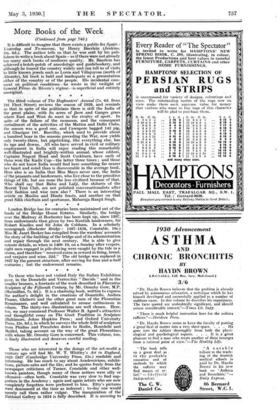The /bird volun.le of The Iloghunters' Annual (7s. 6d. from
191 Fleet: Street) reviews the season of -1929, and reminds us that in spite- of the politicians there is still the India of the great -plains, with its acres of -jhow and Ganges grass where East and ,West do meet :in " the rivalry of sport. In spite, of the failure of the monsoon,- and the consequent curtailment. of the activities of the Muttra and Delhi Clubs, the season was a good one, and Caw.npore. bagged 142 pig, and Ghazipur 101. Barcilby, which used to provide about a hundred boar-in the seasons preceding the War, now yields only twenty-three, but. pigsticking, like everything else, has its ups and downs. All who have served in.civil or military employment in India will enjoy reading this remarkably well-illustrated andbrightly-written annual, whose editors, Captains Nugent Head and Scott Cockburn, have each of thenf,iviiii the:Ka- dir ttip—the latter three times ; and those who do not know India would find here something far nearer her heart and mind than is discoverable in the average 'look. Here also is an India that Miss Mayo never saw, the India of the peasants and landowners, who live close to the primitive things of life; but are none the less civilized because of that. Who shall Say that Babu: and Lalji; the shikaris of the Meertit Tent thib, are not -polished- conversationalists after their "fashion and wise men also ? There is an interesting article On .-Muslim and Hindi' feasts, and another on that great Sikh `chieftain and sportsman, Maharaja Ranjit Singh.
• ,* . a,














































 Previous page
Previous page